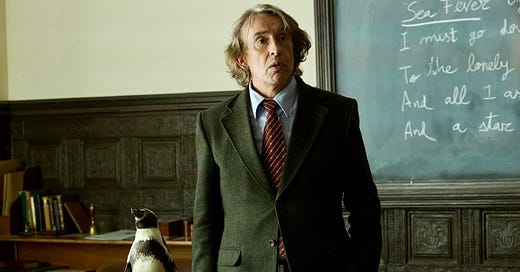In Theatres Now: "The Penguin Lessons" Brilliantly Combines Humor with Serious Political Issues
The distinct personalities and the mix of comic and tragic events add exceptional complexity
Often, comedy is expected to be, and dismissed as, mere escapist fare. However, many of the most delightful cinematic experiences offer a delicious, sugar-coated pill, that is, very serious personal and/or political commentary encased in a light-hearted, humorous narrative. “The Penguin Lessons” delivers exactly that in its laugh-out-loud characters’ interaction set against the backdrop of Argentina’s 1976 military takeover involving illegal arrests and ruthless murders. Declaring martial law, under the newly installed junta, authorities killed an estimated 30,000 people, many known as ‘the disappeared’ whom families never found.
This grim history sounds ill-suited for comic treatment. However, as he did in “The Full Monty,” director Peter Cattaneo accomplishes an exquisite balancing act of hilarious scenes and terrifying oppression by relying on the irresistible charm of the title Magellanic penguin and the sensational comic timing of Steve Coogan. He plays Tom Michell, an English teacher who arrives at the upscale St. George’s school in Buenos Aires’ suburbs just before the 24 March 1976 coup d’etat ousts President Isabel Perón. Explosions in the far background and ‘bastardos fascistas’ graffiti on the wall at this relatively isolated location immediately establish the political upheaval. Sensitive to the allegiances of the families’ affiliated with St. George’s, the dour headmaster Buckle cautions Tom, during his intake interview, to avoid politics at all costs. Having set the scene, Cattaneo masterfully foreshadows a range of significant issues and the affected individuals’ reactions to a hostile environment.
A metaphorical fish out of water, Tom is assigned to coach rugby about which he knows nothing (think Ted Lasso in Argentina). An indifferent teacher, he ineffectively faces uncooperative students, persisting in presenting abstract poetry while hiding behind an aloof manner with his peers. Tom’s touching, nicely tossed-off backstory emerges on a bus trip with his Finnish colleague Michel (a wonderfully droll and often clueless Björn Gustafsson) as the two flee from Argentina’s unrest to Uruguay. There, walking on a deserted beach as Tom flirts with a woman met in a bar, they find an oil-soaked Magellanic penguin. Rescued by a reluctant Tom, that disarming, flightless bird will fixate on him, much to his dismay. Subsequent encounters unfold with Tom alternately embarrassingly hiding or proudly displaying his rescued friend.
Adapting Roger Michell’s 2016 memoir of these adventures, screenwriter Jeff Pope has the good sense to rely on undemonstrative reaction shots and the captivating appeal of Juan. The cast includes Jonathan Pryce as the uptight headmaster Buckle, caretaker Maria (a wonderful Vivian El Jaber), her granddaughter Sofia (Alfonsina Carrocio), and a group of likeable students. All will not go smoothly as the tyrannical military intrude after the granddaughter becomes more assertive in her and her fishmonger friend’s objections to repression. The distinct personalities and the mix of comic and tragic events add exceptional complexity, a combination that progresses circuitously, for Tom is not a stereotypical hero but a complicated man with fear initially dictating behavior. Occasionally, Federico Jusid’s music overstates the emotions, but, on balance, sentiment is honestly earned. Isona Rigau’s art direction (understated colors,1970s costumes, unpretentious furniture) and Xavi Giménez’s economical cinematography keep the focus where it belongs, on the good people caught in tragic circumstances.
For his part, enhancing his humanity, the penguin is named Juan Salvador, after the Spanish identity for the popular 1970s Jonathan Livingston Seagull. This Juan has charisma as performed by Papa and Richard, two real Magellanic penguins interacting with Coogan for all but a handful of scenes with animatronic stand-ins. Coogan, who spent hours befriending the penguins, wisely defers to his costar Juan who becomes a therapist for several characters. He’s a good listener. Above all, “The Penguin Lessons” has something to say, as the title suggests. We are reminded that today as well what matters is finding the courage to stand up for what is humane and honorable.




